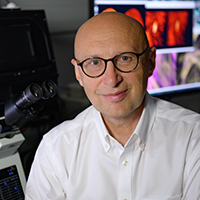Stefan W Hell

Stefan W. Hell
2014 Nobel Prize In Chemistry
To fully understand how cell functions, scientists must be able to track the work of individual molecules. In 1873, however, scientist Ernst Abbe published an equation showing how optical microscopes’ resolution is limited to about half the wavelength of light or 200 nanometres. Under this limitation, it is possible to see some of the cells’ structures, but not smaller objects in them, such as small molecules, or their interactions.
Professor Stefan Hell developed a microscopy method called stimulated emission depletion (STED) that bypasses this limitation. His pioneering technique helped researchers to peer into the nanoworld of cells, and he received the Nobel Prize in Chemistry in 2014 alongside two other scientists.
Traditionally, scientists used microscopes to focus light onto a point on the cell sample to get molecules to glow so they can image them. As light travels in waves, however, that point is actually a circle with a radius of at least 200 nanometres. All the molecules within that circle will glow at the same time when the light hits them, producing a fluorescent blob that makes it impossible for researchers to discern individual molecules.
Professor Hell’s innovation was to add a second beam of light with a hole in its centre. This beam darkens the molecules that it hits, so that only the molecules within the hole continue to glow. By moving the two light beams across the sample, scientists can thus get much higher resolution images.
He has also continued to break new ground in microscopy, developing two other methods, called MINSTED and MINFLUX, to produce even higher resolution images. STED achieved a resolution of 20 to 30 nanometres, generating images that were about 10 times sharper. MINSTED provides a resolution of one to three nanometres, enabling researchers to separate and track individual molecules that are only a few nanometres apart.
Professor Hell is now Director at both the Max Planck Institute for Biophysical Chemistry and Max Planck Institute for Medical Research. He has also won the Kavli Prize, Otto Hahn Prize, Wilhelm Exner Medal and other awards.

